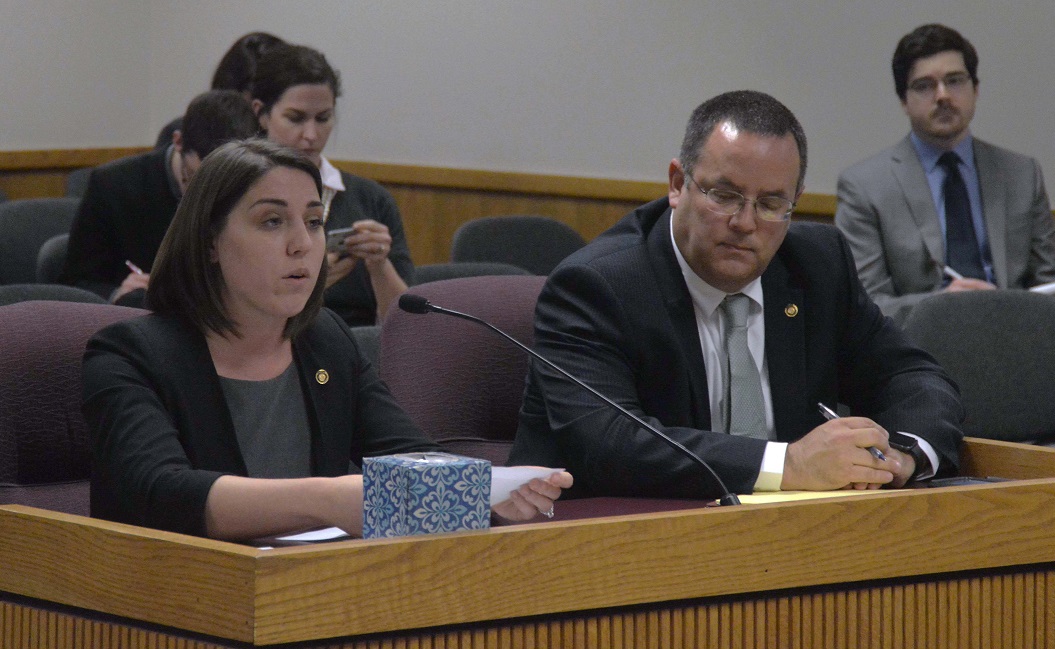Representative Dan Shaul is leaving the Missouri House due to term limits. He said his goodbyes and reflected on his time in the Chamber, last Friday.
“When you leave here you leave here quickly.”
Representative Dan Shaul is leaving the Missouri House due to term limits. He said his goodbyes and reflected on his time in the Chamber, last Friday.
“When you leave here you leave here quickly.”
Bipartisan legislation in the Missouri House seeks to help families stave off what’s called the “cliff effect,” with child care.

The “cliff effect” refers to a person receiving a pay increase that puts him or her over the income limit for receiving a state benefit.
Shaul, whose wife is a social worker, and Representative Crystal Quade (D-Springfield), who herself is a social worker, are sponsoring identical legislation that would launch a pilot program in Green, Jefferson, and Pemiscot Counties. It would allow individuals to participate in an existing transitional program.
That program offers tiered levels of childcare subsidies based on the individual’s income level, but requires participants to start at its lowest income level. Under Quade and Shaul’s bills, a participant could enter the program at his or her current income level, rather than have to take a lesser-paying job.
Quade said the program would keep working parents from having to make tough choices about whether to accept better pay, or to decline it because it would not offset the cost of losing government assistance.
The House Committee on Children and Families held a hearing on those bills, House Bill 712 (Shaul) and House Bill 713 (Quade). They heard testimony from several Missourians including Leann Seipel of Sparta, who told representatives she had to turn down a 15-cents per hour raise to avoid losing her child care subsidy. She still lost the subsidy for one month.
Meghan Roetto of Republic moved from Montana to Missouri after her husband returned from serving in Iraq and left her and her daughter.
She told lawmakers she was frustrated when after going to college and getting a bachelor’s degree, she was offered a $10 an hour job, and that meant she would not be eligible for child care assistance.
Shaul said he and Quade decided to work together on the issue after discussing it, “somewhere between Poplar Bluff, Missouri, and Rolla,” during the tour for freshmen legislators, held between the November election and before the start of session.
The committee has not voted on those bills.
House Republicans are fast-tracking bills meant to assert that only the state can set a minimum wage, while Democrats say the bills are a rushed effort that goes back on a promise legislators made two years ago to the people of St. Louis.
The state Supreme Court last week threw out 1998 language that prevented local governments from setting a minimum wage exceeding that set by the state. In response, Representatives Dan Shaul (R-Imperial) and Jason Chipman (R-Steelville) introduced on March 1 House Bills 1193 and 1194, respectively, both of which would bar political subdivisions from requiring a minimum wage exceeding that of the state.
“What I’m trying to do is ensure that a community doesn’t become fragmented and businesses don’t continue to move out of the State of Missouri or the City of St. Louis due to fragmentation,” said Shaul, who said having the minimum wage vary in different parts of the state would hurt businesses and cause confusion.
“The state minimum wage is called ‘the state minimum wage’ because it is the state minimum wage,” said Shaul.
Gladstone Democrat Jon Carpenter said the bills ask the legislature to reverse a decision it made two years ago.
House Bill 722, passed in 2015, also had language barring the setting of a higher minimum wage by local governments. It included a “grandfather clause,” allowing previous wage agreements between private vendors and the City of St. Louis to stand if they were enacted prior to August 28 of that year.
St. Louis enacted an ordinance on August 28, 2015, increasing its minimum wage first to $10 per hour this year and then to $11 per hour next year. Lawsuits delayed implementation of that ordinance, which is now set to take effect later this month.
Carpenter said lawmakers in 2015 agreed the grandfather clause would also allow to stand the new St. Louis minimum wage ordinance, and argued that pending pay hike is why the bills are being moved so quickly. Normally legislation goes through two committees before reaching the floor for debate, but these will go through only one. They also include “emergency clauses,” which would make them effective immediately upon being signed by the governor.
St. Louis Mayor Francis Slay (D), who traveled to the Capitol to testify against the bills, called it “unbelievable,” that the proposals were offered.
Republicans acknowledge the bill is being fast-tracked, but say that is to protect businesses from disruption.
The House Committee on Rules – Administrative Oversight heard, too, from some St. Louis restaurant owners who said the minimum wage hike would force them to chair their business models and let go of some staff, as well as from some St. Louis workers who said they struggle to survive on their current salaries and said the wage increase is needed for many people to pay for basic needs.
The committee, after more than three hours of testimony and debate, voted 10-4 along party lines to advance the bills.